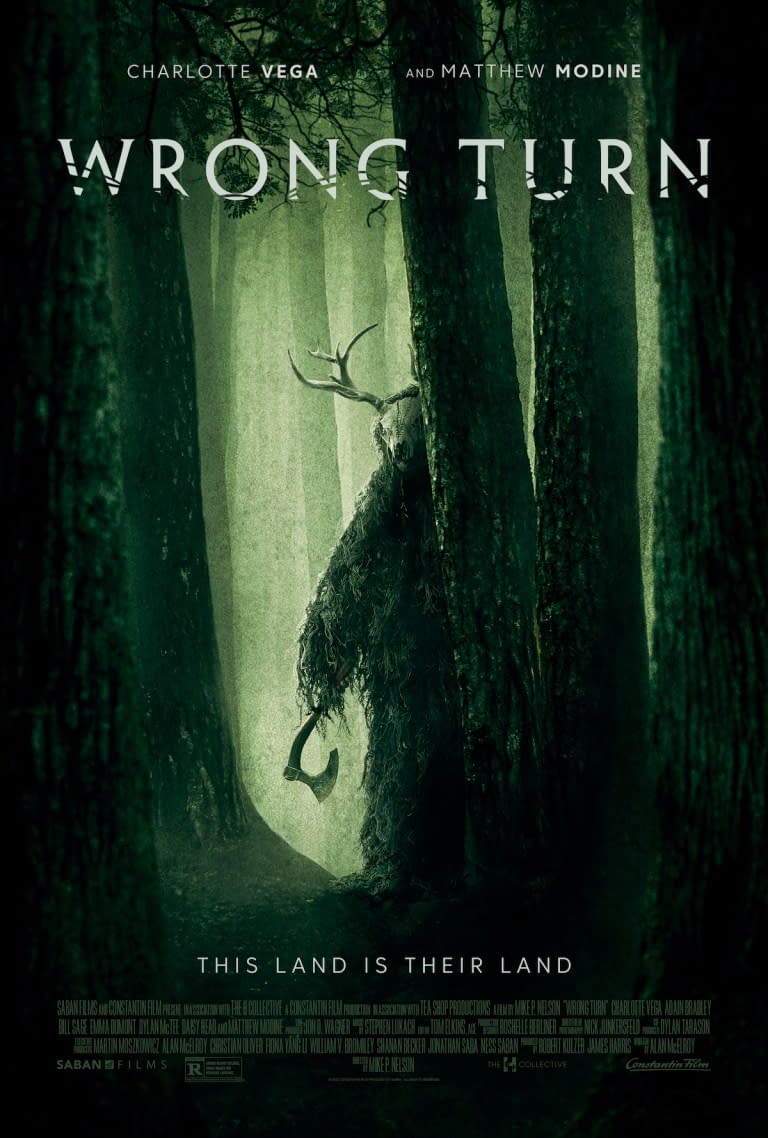WRONG TURN Review–Bloody Horror Remake Gets Political


Starring Charlotte Vega and Matthew Modine
Written by Alan McElroy
Directed by Mike P. Nelson
The slasher craze of the early to late eighties had one principal goal in mind: rack up as large a body count in as little time as possible. Sincere development, nuance, and humanity were often tossed aside for austere and penny-pain archetypes. Jocks, for instance, died while virginal final girls lived. Wes Craven’s Scream and the slashers of the mid-to-late nineties augured in a more critical slasher lens, one imbued with meta-awareness and broader social horizons. The core cast of potential victims shrank, the scope expanded, and the budgets ballooned. It was at the tail end of this era that the first Wrong Turn emerged in 2003. An intimate cast of core characters took, as the title implies, a wrong turn, running afoul of mountainous cannibals in the hinterlands of Appalachia. Eighteen years later, Wrong Turn is back at the hindmost part of another horror craze, and resultantly, 2021’s Wrong Turn is an entirely different beast.
Different, of course, being the operative word, because, beyond title and setting, the newest Wrong Turn bears no connective tissue with its forbears. The inbred cannibals are gone and replaced by members of The Foundation, a pre-Civil War era group of settlers who retreated into the mountains to form a utopia, fearing their own country was on the verge of collapse. Just as the original was released in an era of high concept, high gore horror, the remake comes at a time where fans demand more of their genre outputs. Wrong Turn is political, incendiary, and laden with buzzwords of the digital zeitgeist. Unfortunately, Wrong Turn wants to be two things at once, feeling like two different movies stitched together, neither of which are given enough time to prove foundational on their own.
Parts of Wrong Turn, particularly in the first and third act, play as something of a Grand Guignol of grotesqueries and gore, and it’s in these sections that the franchise’s backwoods bloodshed roots feel most pronounced and familiar. Heads are split open with Midsommar crime scene verisimilitude, bodies are crushed, and predators pursue prey through cracked crevices and verdant mountain brush. There’s a wistful pleasure to be found here, a welcome return to the carnage quotient of decades-old slasher fare as the movie metes out punishment and death when myopic millennials encroach on cliffsides and banks where they don’t belong. The kills come hard and fast, and while some fans might take umbrage with most of the deaths occurring off-screen, the resultant carnage is savage (and, thankfully, practical) enough to elicit sizeable and visceral reactions– this movie is brutal.
The second act, however, is both thematically and narratively lost as the sextet of hikers mislaid in its woods. It’s here that Wrong Turn conceives and commits to an almost fatal moral equivalency that threatens to derail the entire enterprise. Without risking spoilers, Jen (Charlotte Vega) and her friends are juxtaposed with their pursuers with the same kind of misplaced empathy that vitiated any chance Texas Chainsaw 3D had of revitalizing its own legacy. Worse still, Wrong Turn is unable to follow through, propounding and then quickly abandoning this change in perspective, rendering the entire enterprise moot by the time the third act ushers in hide-and-seek suspense and efficient, bloody showdowns.
It’s a movie that routinely feels at odds with itself, eager to imbue its workings with the kind of socially charged fodder that might elevate it above some of its slasher brethren without having the moxie to pledge itself entirely to the politics of its new world. It’s never quite clear what this new Wrong Turn wants to say or to whom it wants to say it. It’s a shame, then, because the fractions of the movie not yet turned whole are viciously and viscerally effective. The soundtrack pulsates and energizes, the backwoods photography is stellar, and the set-design in particular carves its own distinct identity in the larger iconography of Nordic cult symbolism.
Wrong Turn is certainly a curious departure for a franchise defined in large part by direct-to-video exploitation to take, and it’s not an entirely unwelcome one. Though less assured than it should be– especially considering the return of original writer Alan McElroy– there’s enough that works to warrant a look. Like the sequestered society at its center, Wrong Turn endeavors to subvert decades of expectations in pursuit of something greater than itself. Wrong Turn isn’t greater than itself, and it’s frankly not greater than the movie it attempts to reboot, but if it isn’t greater, it’s at least commendably different. Sometimes, that’s enough.
-
Wrong Turn
Summary
Wrong Turn’s throwback slasher thrills are enough to make up for an uneven narrative and dicey politics.
Categorized:Reviews
